Cicadas will soon emerge in North Carolina, Virginia and West Virginia starting this month
Jessica Flores, USA TODAY
It's that time of year again: cicadas are expected to emerge in the East coast after living underground for 17 years.

© Sci/Tech The return of the cicadas
This year's periodical cicadas, which will appear this month in North Carolina, Virginia and West Virginia, are called " Brood IX (9)."
Cicadas emerge when the ground reaches 64 degrees Fahrenheit, according to the website CicadaMania.
John Cooley, an entomologist at the University of Connecticut, told USA TODAY that cicadas pop up in the evening "to be able to do the things that they have to do but it's also going to be dark enough that they're not going to get wiped out by birds."
Cicadas, which are grouped into "broods," come out of the ground every 17 years to mate, with some appearing every 13 years. Cooley says researchers don't know why the insects have a reoccurring appearance.
“The general consensus is that the long, prime-numbered life-cycle makes it difficult for an above-ground animal predator to evolve to specifically predate them,” according to Cicada Mania.
This year's periodical cicadas, which will appear this month in North Carolina, Virginia and West Virginia, are called " Brood IX (9)."
Cicadas emerge when the ground reaches 64 degrees Fahrenheit, according to the website CicadaMania.
John Cooley, an entomologist at the University of Connecticut, told USA TODAY that cicadas pop up in the evening "to be able to do the things that they have to do but it's also going to be dark enough that they're not going to get wiped out by birds."
Cicadas, which are grouped into "broods," come out of the ground every 17 years to mate, with some appearing every 13 years. Cooley says researchers don't know why the insects have a reoccurring appearance.
“The general consensus is that the long, prime-numbered life-cycle makes it difficult for an above-ground animal predator to evolve to specifically predate them,” according to Cicada Mania.

© USDA Forest Service Northern Research Station and Northeastern Area State & Private Forestry Active Periodical Cicada Broods of the United States.
More than one type of brood may emerge in some areas at the same time due to staggered development, according to the United States Department of Agriculture.
There are periodical and annual cicadas. The periodical cicadas shed their outer covering once they pop out of the ground, and have black bodies with red eyes and yellowish-orange wings. Annual cicadas are larger in size and have brown or green bodies with black or brown eyes, and black or green wings.
Cicadas are also not dangerous. The male cicadas flexes its muscles to make a loud sound to attract females. And many usually live two to four weeks after living underground for 17 years.
More than one type of brood may emerge in some areas at the same time due to staggered development, according to the United States Department of Agriculture.
There are periodical and annual cicadas. The periodical cicadas shed their outer covering once they pop out of the ground, and have black bodies with red eyes and yellowish-orange wings. Annual cicadas are larger in size and have brown or green bodies with black or brown eyes, and black or green wings.
Cicadas are also not dangerous. The male cicadas flexes its muscles to make a loud sound to attract females. And many usually live two to four weeks after living underground for 17 years.
No comments:
Post a Comment